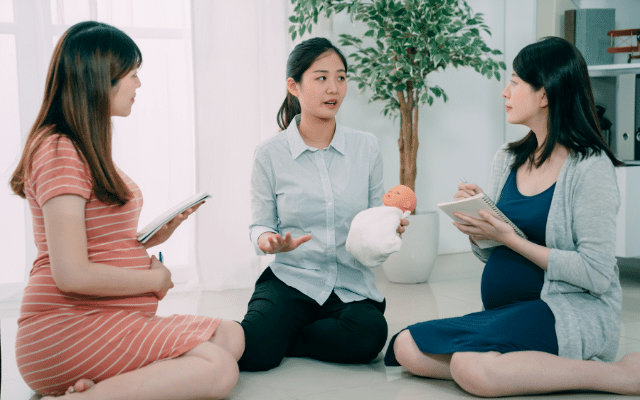Ask the expert: When a healthy baby is NOT the only thing that matters, how to get the care you trust

Every expectant parent wants a healthy baby, but a positive birth experience is also important. So how do you find a care provider you trust to help you make informed decisions and support your wishes? We spoke to Sunshine Coast birthing educator and maternal health advocate Alecia Staines.
Often women hear, “The most important thing is that you’re healthy and you have a healthy baby”. But, to what extent is it true?
It’s 100% true, provided we incorporate a mother’s mental and emotional wellbeing into that definition of health. Often when we’re talking about that rhetoric around “all that matters is a healthy baby and a healthy woman”, really all we’re talking about is being alive.
It places women in the position where they feel like it’s an either/or – I can’t have a healthy baby AND be mentally and emotionally well.
And I think we need to see mental and emotional health as just as valuable as physical health. When a mother is mentally and emotionally well, then she can mother better.
When women feel like they’re not totally in control of their journey throughout pregnancy and birth, what are some of the reasons?
As women, we’ve been conditioned to be very compliant, particularly around birth – and this has gone on for hundreds of years.
We’ve also got a power imbalance of a hierarchical structure [in healthcare]. The way that policies and guidelines are written, along with the culture in the hospital, says, “This is what’s happening to you, and this is how you’ll have your baby”.
“This is what’s happening to you, and this is how you’ll have your baby”.
Most of that out-of-control feeling is actually disrespectful maternity care. So it’s now given a title of “obstetric violence“. And that does include more physical , like assault, but the lower end of that is disrespectful maternity care.
It can include a lack of informed consent. It’s hard for women to make that informed consent if they’re not given enough information, and it really should be unbiased and evidence-based information.
Plus, birth in itself is an out-of-control experience because you can’t predict it – it’s a physiological process.
How can women be prepared for different scenarios that might occur during pregnancy, labour and birth, without becoming scared about things that may never happen?
I think women should become educated on the physiological process [of birth]. Because for most women, it is about physiology, and our bodies and babies, in most instances, know what to do.
The next aspect of it would be to understand that legally the woman gets to make the decisions about her and her baby, plus the process of informed consent and how that works. Surveys over the years show that over 40% of women said they didn’t experience informed consent when asked about their caesarean.
Consent is more than just signing the form on the way into surgery. It has to include benefits, risks and alternatives. So that a woman is really certain because that’s where birth satisfaction comes in.
It’s not always the way a healthy baby is born. It’s the way the woman was treated and whether she felt in control. For women, it means making sure you’re the final decision maker, and you don’t feel like you’re being bullied or coerced into a decision.
Are there any shortcuts to identifying the best health care provider?
Yes, having a known midwife does deliver the best outcomes. Private midwifery seems to have that insulating effect against stress – particularly at the moment during the pandemic.
If you want a normal, natural birth and you’re going to a private obstetrician with a high caesarean rate, you’re not going to get the birth you want. Or you’re going to have to fight for it, and you don’t want to be fighting for what you want at birth.
If they can’t get private midwifery care, I encourage women to look at continuity of midwifery care. Sometimes it could be the birth centre, or it could be the midwifery group practice. Then there are doulas and other birth supports.
For women who do see an obstetrician, they really need to have that frank, honest conversation early on, not at 36 weeks when it’s birth planning time. So at that first appointment, have that discussion: what’s your philosophy, what do you think of (whatever I as a woman want), and what are your intervention rates?
I often say to women, think about it like you are shopping for a baby’s car seat or a pram. Think from a buying perspective. You wouldn’t just grab one, and say “that’ll do”.

Women can do their research, but it’s not the same as having the experience and qualifications of a midwife, obstetrician or GP. So how do we know when to have faith in the advice we’re given?
Well, I think we do have intuition. I had a woman call the other day who said to me, “Do you think he’s pulling my leg? He said because I’m short, I can’t have a water birth.” I said, “You answered your question. The fact that you’re asking me should tell you that your intuition is going hang on a minute, alarm bells, that doesn’t sound right!”
Again, apply that lens of being a consumer. Where is this evidence coming from? Is it good quality evidence? Where are some other sources?
Use the BRAIN acronym – what are the benefits, risks and alternatives? What’s my intuition telling me? What happens if I do nothing?
And give me some space to make that decision. Space can mean, “Can you leave the room so that I can have a discussion with my partner?” You need to use that logical part of your brain to go through the process rather than feel you’re under pressure to make that decision then and there.
The end of the conversation should be, “What do you want to do?”
That makes the woman the decision-maker. So you can have very similar births but totally different outcomes from a mental and emotional perspective because one woman felt in control while the other felt she was spoken down to and told what to do.
What is the one thing you want women to know about advocating for themselves throughout their pregnancy and birth?
I would say don’t be scared to say “No”. At the end of the day, you’re going to remember your birth, your healthy baby, for the rest of your life, and those around you probably are not.
Alecia Staines is the Director of the Maternity Consumer Network and a HypnoBirthing and yoga instructor. She also hosts a podcast – Birth, the forgotten feminist issue.
Published on 31st December 2021
About the Author
Louise Wedgwood is a freelance health and parenting writer, working with magazines, online publications and businesses. She has a background in health science, and enjoys helping parents make evidence-based choices. Her own children have shown her making the right decisions is never black-and-white.
Further Reading
Share this Post
Recent Posts
Recent Comments
- Jane Palmer on How to use your breast milk donation to help other mums and unwell bubs
- Libby Salmon on How to use your breast milk donation to help other mums and unwell bubs
- Sofia on 3 Easy Baby Food Recipes You Can Make at Home
- Jane Palmer on The History of Waterbirth
- Anand Khushi on The History of Waterbirth
Archives
Categories
PBB’s Social Media Pages
The post Ask the expert: When a healthy baby is NOT the only thing that matters, how to get the care you trust appeared first on Pregnancy Birth and Beyond.




